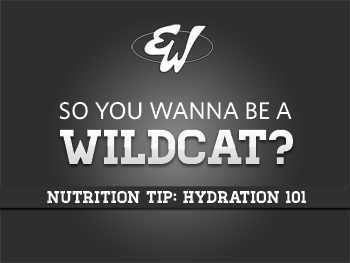
So You Wanna Be A Wildcat? Hydration 101
Hydration 101
The weather for Edmonton’s summer is supposed to be one thing: Hot! As we head into our training season in a record temperature summer, there are a few facts and tips we’d list to share to prevent dehydration. Being dehydrated will negatively influence both your exercise performance and your mental functioning. By balancing your fluid intake with fluid losses (from sweat), you can prevent becoming dehydrated.
Signs of Dehydration
1st Sign: Thirst, general discomfort, and dark urine (should be lemonade coloured)
2nd Sign: Flushed skin, general fatigue, and muscle cramping
3rd Sign: Dizzy, headaches, vomiting, and the chills
What Happens:
-Core temperature rises, causing your body temperature to rise faster during exercise
-Increased body temp increases risk of heat-related illnesses and injuries
-You sweat to protect yourself from these injuries
-This sweat comes from your blood, causing it to thicken
-Your heart has to work harder to pump your blood, increasing your heart rate
-Your core temp is raised and cardiovascular system strained, which makes you reach physical exhaustion faster
When To Drink:
-All day. You should be drinking a minimum of 4L of fluid each day.
-Make sure to drink 2-3 hours leading up to practice/game time, and then during exercise. Gulp, do not sip your drink during exercise.
-The goal is to drink to match what you’re losing. To see how much water you’re losing, you can weigh yourself before and after and calculate the difference.
What To Drink:
All fluids count except alcohol. Sports drinks contain carbohydrates and salt, which during exercise can help you absorb the fluid faster and replenish electrolytes lost from sweating.
Sources: USA Football & Coach Branting


